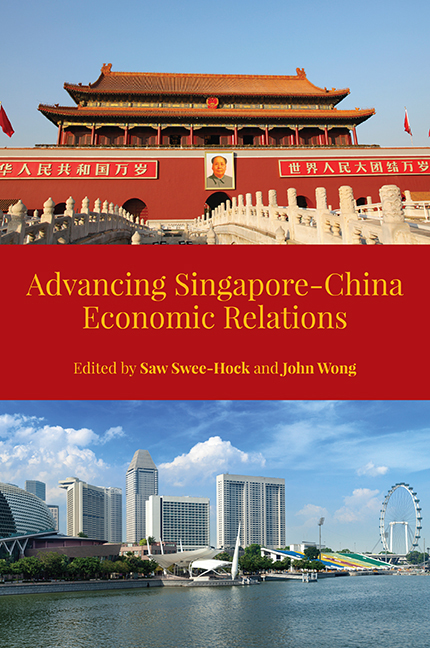Book contents
- Frontmatter
- Contents
- List of Tables
- List of Figures
- Preface
- The Contributors
- 1 Evolution of Singapore-China Economic Relations
- 2 The Political Economy of Singapore's Unique Relations with China
- 3 Suzhou Industrial Park: Going Beyond a Commercial Project
- 4 Translating Concept into Practice: Sino-Singapore Tianjin Eco-City Project
- 5 China's Foreign Direct Investment in Singapore since the 2000s
- 6 Singapore's Direct Investment in China since the 1980s
- 7 Singapore-China Trade and CSFTA
- 8 Growth of Tourism between China and Singapore
- 9 Enhancing Educational Collaborations between China and Singapore
- Index
3 - Suzhou Industrial Park: Going Beyond a Commercial Project
Published online by Cambridge University Press: 21 October 2015
- Frontmatter
- Contents
- List of Tables
- List of Figures
- Preface
- The Contributors
- 1 Evolution of Singapore-China Economic Relations
- 2 The Political Economy of Singapore's Unique Relations with China
- 3 Suzhou Industrial Park: Going Beyond a Commercial Project
- 4 Translating Concept into Practice: Sino-Singapore Tianjin Eco-City Project
- 5 China's Foreign Direct Investment in Singapore since the 2000s
- 6 Singapore's Direct Investment in China since the 1980s
- 7 Singapore-China Trade and CSFTA
- 8 Growth of Tourism between China and Singapore
- 9 Enhancing Educational Collaborations between China and Singapore
- Index
Summary
Introduction
Most industrial parks are run on a commercial basis, with minimal or no governmental intervention. If the government is involved, it is usually to provide a conducive regulatory framework or the right incentives to give the industrial park a head start in attracting investors. It would appear that the lesser the government involvement the better it is for any particular industrial park to reach its full market potential.
Yet, the Suzhou Industrial Park (SIP), which Singapore and China embarked on in 1994, was and still is no ordinary industrial park. Like other industrial parks, it had to be commercially viable in order to be sustainable. Unlike other industrial parks, the SIP served a broader strategic and political function that is less known. More specifically, it provided a platform for government and business leaders, especially the younger ones, from both sides to come together and work on a common project. By working on the details of the project, both sides would get to know each other better. This would lay the basis for a long-term and robust relationship. More significantly, arising from the SIP, a high-level institutional mechanism was developed and consequently expanded to oversee all areas of bilateral cooperation. Moreover, the Singapore brand name that is often associated with the project has generated positive mileage for both sides. On these counts, the SIP performs a function that goes beyond that of a purely commercially-run industrial park.
This chapter examines the SIP within the broader context of the Sino-Singapore relationship. It argues that the project laid a good foundation for the development of bilateral ties. To flesh out this argument, we will focus on four key aspects. First, it will touch on the origin of the SIP. It will discuss the broad political context in which the SIP was conceived. This will show how the governments of the two countries were actively involved in conception of the project.
Second, we will outline the defining feature of the project which is the transfer of Singapore's economic management and public administration software.
- Type
- Chapter
- Information
- Advancing Singapore-China Economic Relations , pp. 62 - 93Publisher: ISEAS–Yusof Ishak InstitutePrint publication year: 2014



